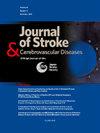卒中幸存者的多药和处方态度:加强以患者为中心的护理的机会
IF 1.8
4区 医学
Q3 NEUROSCIENCES
Journal of Stroke & Cerebrovascular Diseases
Pub Date : 2025-08-19
DOI:10.1016/j.jstrokecerebrovasdis.2025.108432
引用次数: 0
摘要
目的本研究旨在1)描述脑卒中幸存者与无脑卒中史的老年人的多重用药负担,2)评估他们对药物处方的态度。方法:本研究是一项横断面研究,研究对象为参加国家健康与老龄化趋势研究的年龄≥65岁的美国医疗保险受益人。多重用药以报告的常规用药次数定义(无多重用药,≤5种;中度,6-10种;重度,>;10种)。从用药态度模块中引出处方态度。顺序回归和逻辑回归评估了多种用药、卒中史和处方态度之间的关系,并对跌倒和合并症进行了调整。结果在2073名受访者中,253人报告有中风史。与没有卒中史的老年人相比,卒中幸存者更有可能报告多重用药(中度:39.4% vs 29.8%;重度:22.6% vs 9.8%; p < 0.01)。大多数中风幸存者(87.1%)和没有中风的老年人(89.0%)愿意停止一种或多种药物。多药与赞成处方态度的相关性最强。结论:卒中幸存者比无卒中史的老年人报告更多的多重用药。这两个群体都压倒性地支持减少处方。中风幸存者代表了一个关键人群,他们将欢迎并受益于解除处方的努力。本文章由计算机程序翻译,如有差异,请以英文原文为准。
Polypharmacy and deprescribing attitudes among stroke survivors: Opportunities for enhanced patient centered care
Objective
This study aimed to 1) describe the burden of polypharmacy among stroke survivors compared to older adults without a history of stroke and 2) assess their attitudes towards deprescribing.
Methods
This is a cross-sectional study of US Medicare Beneficiaries aged ≥65 who participated in the National Health and Aging Trends Study. Polypharmacy was defined by the number of regular medications reported (no polypharmacy, ≤5; moderate, 6-10; severe, >10). Deprescribing attitudes were elicited from the Medication Attitudes Module. Ordinal and logistic regression assessed the associations between polypharmacy, history of stroke, and deprescribing attitudes, adjusting for falls and comorbidities.
Results
Of the 2073 respondents, 253 reported a prior stroke. Compared to older adults without a history of stroke, stroke survivors were more likely to report polypharmacy (moderate: 39.4 % vs 29.8 %; severe: 22.6 % vs 9.8 %; p < 0.01). Most stroke survivors (87.1 %) and older adults without stroke (89.0 %) would be willing to stop one or more medications. Polypharmacy had the strongest association with favorable attitudes toward deprescribing.
Conclusion
Stroke survivors report greater polypharmacy than older adults without a history of stroke. Both groups overwhelmingly favor deprescribing. Stroke survivors represent a key population that would welcome and benefit from efforts to deprescribe.
求助全文
通过发布文献求助,成功后即可免费获取论文全文。
去求助
来源期刊

Journal of Stroke & Cerebrovascular Diseases
Medicine-Surgery
CiteScore
5.00
自引率
4.00%
发文量
583
审稿时长
62 days
期刊介绍:
The Journal of Stroke & Cerebrovascular Diseases publishes original papers on basic and clinical science related to the fields of stroke and cerebrovascular diseases. The Journal also features review articles, controversies, methods and technical notes, selected case reports and other original articles of special nature. Its editorial mission is to focus on prevention and repair of cerebrovascular disease. Clinical papers emphasize medical and surgical aspects of stroke, clinical trials and design, epidemiology, stroke care delivery systems and outcomes, imaging sciences and rehabilitation of stroke. The Journal will be of special interest to specialists involved in caring for patients with cerebrovascular disease, including neurologists, neurosurgeons and cardiologists.
 求助内容:
求助内容: 应助结果提醒方式:
应助结果提醒方式:


